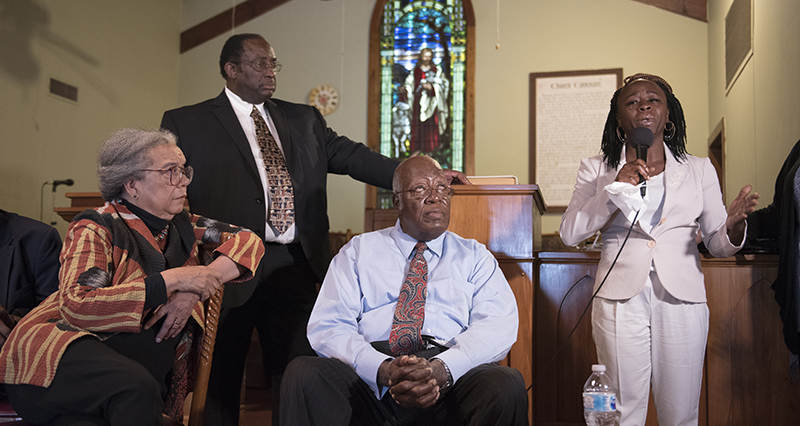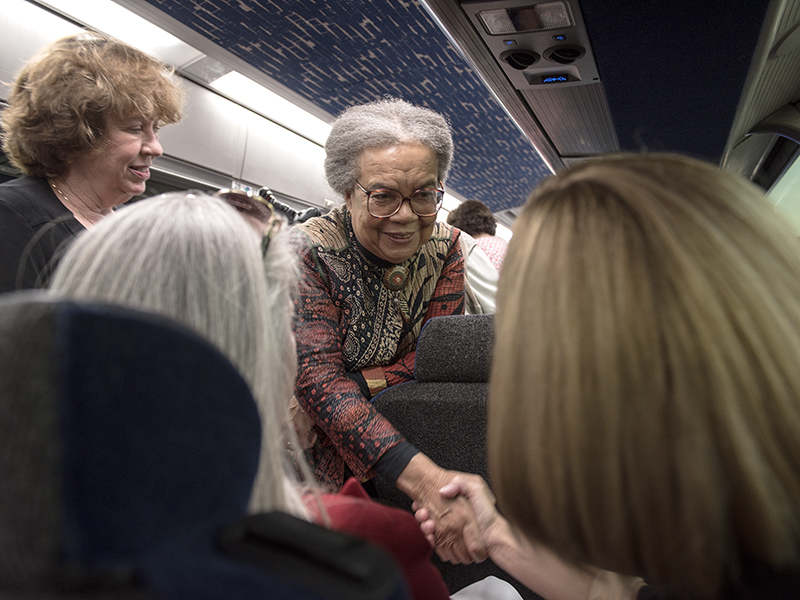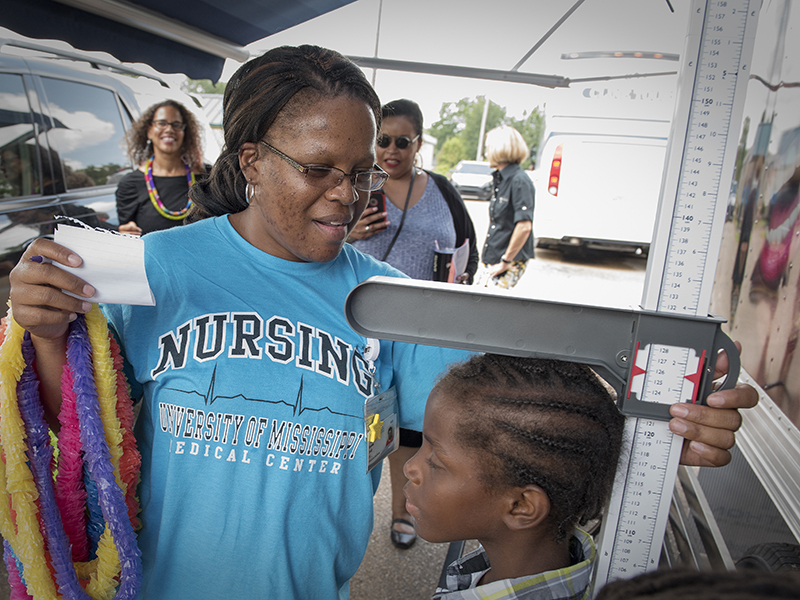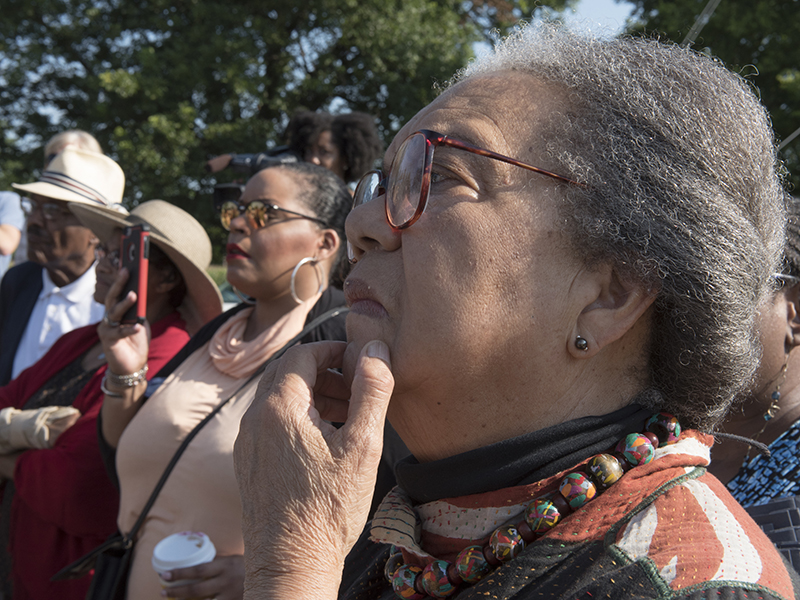Health care trip retraces historic tour, encounters similar challenges
NOTE: This article originally appeared in the August 2017 issue of CONSULT, UMMC's monthly electronic newsletter. To have CONSULT, and more stories like this, delivered directly to your inbox, click here to subscribe.
The same struggles that have stymied the Mississippi’s Delta for decades define the total existence of Otibehia Allen, a single parent of five barely able to keep food in her children’s mouths.
Unlike some in Jonestown, a tiny Coahoma County town of 1,200, Allen is fortunate: She has a job. She’s a part-time data entry clerk at the Aaron E. Henry Community Health Center in Clarksdale, 12 miles down the road.
Allen doesn’t have a car and pays someone $20 a day to take her to work. Getting to an actual grocery store is just as hard.
“I try, every day,” Allen said after fighting twice to gain her composure and control her tears at Mary Bethel Missionary Baptist Church, where she stood at the front of the church and told her story.

She’s all but panicked by how her family could be impacted by proposed federal and state legislation that would deeply slash Medicaid funding and potentially diminish what little access to health care and other safety-net resources she has.
“If you take these things from us, my children will not survive,” said Allen, 32. “Are you telling me you want me to die? That if you take these things from us, you’re better than us?
"Our complexions might not be the same, but we all need equal opportunity.”
Hers is the face of poverty and food insecurity that bears a frustrating resemblance to what U.S. Sen. Robert Kennedy saw in 1967 at the invitation of a 27-year-old NAACP legal defense attorney who testified before a Senate subcommittee taking a look at programs to fight child poverty.
"Come to the Mississippi Delta and see poverty and malnourished children for yourself," the woman who went on to found the Children’s Defense Fund said. Bobby Kennedy said "yes."
What he witnessed – emaciated children who didn’t know where their next meal was coming from, wearing ragged clothing and living in shacks – galvanized him to demand federal programs targeting hunger and to address the dearth of government assistance so children and families living in poverty could receive better care.

From July 11-12, Marian Wright Edelman, now executive director of the Children’s Defense Fund, revisited the historic Delta poverty tour she took 50 years ago with Kennedy. She boarded a chartered bus with an entourage of journalists, lawmakers, health advocates and economic developers for a tour of Glendora in Tallahatchie County, Jonestown in Coahoma County, and Marks in Quitman County.
Also on the bus was a delegation of University of Mississippi Medical Center physicians and nurse leaders. Just like Edelman and health care champions who came before, they are effecting change in child health outcomes in the Delta by operating safety-net school-based and mobile clinics in the most impoverished communities.
From start to finish, Edelman’s mantra did not change.
“This is the most dangerous time we’ve faced,” Edelman said. “I can’t think why a state can turn its back on millions of Medicaid dollars. This is a time that we need to decide not to go backward. We need to go forward.”
In Jonestown or Glendora or Marks, it’s easy to see some things haven’t changed much since Kennedy came around. It’s easy to see why UMMC’s health outreach is making the difference between thousands of children and adults getting primary care or going without.
Overall access to health care is still abysmal, keeping the Delta’s high rates of diabetes, heart disease, hypertension and obesity among the worst in the nation. Employment prospects remain dismal. Schools are dilapidated and receiving rock-bottom ratings from the Mississippi Department of Education. Economic development remains a constant struggle.
Thousands still live in what’s called a "food desert" – communities with no grocery store and little or no access to fresh fruits and vegetables. They live with food insecurity, which means they’re unsure where their next meal will come from. Mississippi leads the nation in food insecurity, with 22 percent affected, much of it in the Delta.
But it’s better than it was in 1967, even though about 34 percent of Mississippi children live in poverty, down from about 50 percent when Kennedy visited. And while gaps in health care abound, the Delta now has a number of community-based clinics.
Through its Mercy Delta Express Project, the University of Mississippi School of Nursing created and staffs three in-school clinics and one Head Start clinic in Sharkey County, which has no pediatricians. UMMC operates primary care clinics in West, Winona and Vaiden, and will open an urgent care clinic in Belzoni this fall.
And the Medical Center’s new School of Population Health is critical, not just to the Delta, but to the state, as it seeks better insight into the prevention and treatment of diseases by addressing poverty and health disparities that impact whole communities.
Although their future may be in some jeopardy, government safety-net programs are in place, including school-based children’s feeding programs; the Supplemental Nutrition Assistance Program, formerly food stamps; and the state Children’s Health Insurance Program, or CHIP. About 459,000 Mississippi children are covered by Medicaid or CHIP.
The School of Nursing parked its new UNACARE mobile clinic at Madison-Shannon Palmer High School in Marks, one of the stops on Edelman’s tour. Dr. Josie Bidwell, a nurse practitioner and assistant professor of nursing, kept it fun as she and others from the School of Nursing tested the children’s strength, reflexes, muscle tone and heartbeat. They also screened the students for scoliosis, quickly running a hand down their backs as the children touched their toes.
“Squeeze my fingers! Oooh, that’s too much!” Bidwell told 10-year-old Jamarious Gilliam of Jonestown, who giggled with delight. “Kick me away. Now pull me back!”
“Students in the Mississippi Delta are facing incredible challenges that significantly impact the concentration and performance of even the best students,” said Dr. Lisa Haynie, professor of nursing and director of Mercy Delta Express. “Abject poverty, single-parent homes, health problems and issues of abuse, among other things, often cloud the lives of these children.”
With an 11-member health care team, the School of Nursing provides medical, dental and health education services to more than 1,000 children attending South Delta Elementary School, South Delta Middle School, South Delta High School and Ripley Blackwell Head Start. The School of Nursing fills a critical gap in a region that doesn’t have a pediatrician.

“There are so many issues that face our kids in schools that aren’t obvious,” said Aurelia Jones-Taylor, executive director of the Aaron E. Henry Community Health Services Center in Clarksdale, during a panel discussion on the tour at Madison-Shannon Palmer High School. “There are nutrition problems. They may not be able to see, and they don’t know they can’t see.”
As Edelman and the tour bus stopped in the three communities, each area's mayors listed the woes that keep their economy depressed and their residents in a cycle of dependency. Even so, there is hope.
“We are six times a food desert because people had to travel 60 miles round-trip to get food,” said Johnny Thomas, Glendora mayor. “But we just recently opened a convenience store.”

Edelman said Mississippi “is the hungriest state in the nation, and unhealthy children do not learn. Ask them on the first day of school if they’re enrolled in health care, and if they’re not, help them get it.
“We have extreme poverty in the richest, most powerful country in the world. That’s wrong. It’s time for another campaign to end child poverty in the United States of America.”


